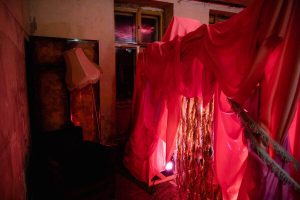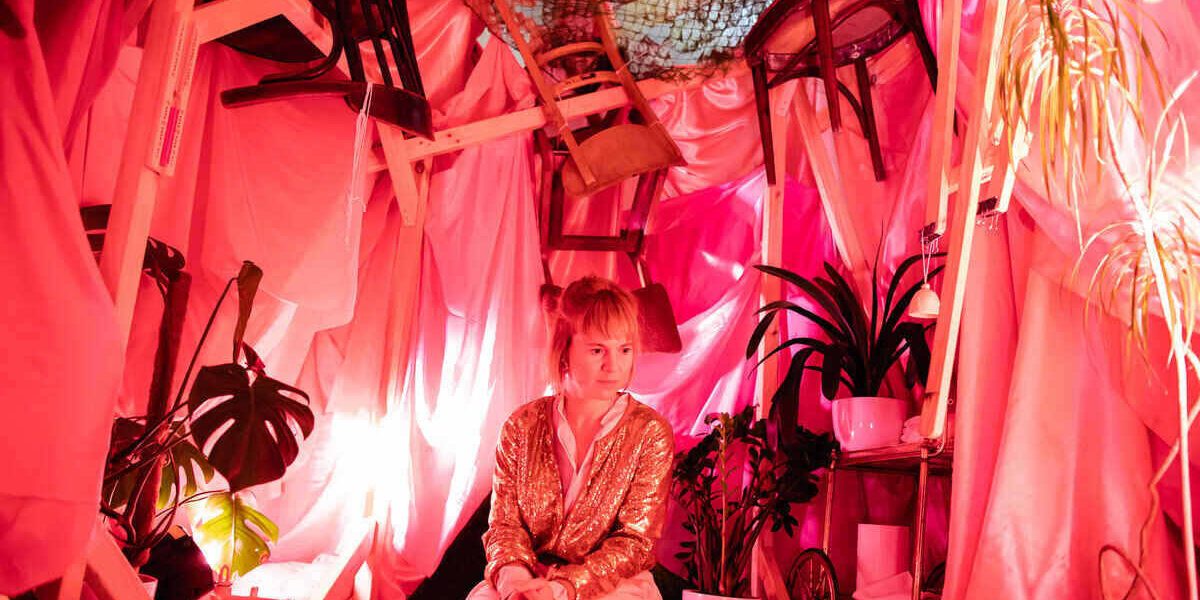Down a side street of ram shackled buildings and rust rimmed cars, there is a door. It is not a welcoming door. In fact, the paint is so chipped that there is more damp and blackened wood on show than visible colour.
There is a faded number on the door, which tells me I am in the right place – this is not reassuring news.
I open the door to darkness.
Instinctively, I let the corridor guide me and I am taken past long-forgotten rooms, with half-covered windows casting what light they can on the objects inside. In one room, there is a bathtub filled with rubbish and hand-painted signs. In others, there are mannequins – some whole, some in pieces.
I can hear water.
I come to the end of the corridor, having made it beyond the mannequins and black silhouettes to what can only be described as safety.

There is a pink blanket fort hanging proudly from the aged ceiling. As Kornelia Trawkowska later explains, blanket forts are a symbol of protection for many children in the Ukraine and Poland. Here, she has recreated her own adult shelter.
Inside, the walls are decorated with chairs. They spiral around the side, some are positioned the correct way up but most are topsy-turvy. There is a small water fountain in the corner and a machine that intermittently puffs incense. The light is warm and I feel instantly at ease.
This space is filled with items that are dear to Kornelia and I’m told that each of them tells a story. Kornelia is going to share her stories with me and tell me a little about her life. This is a performance rooted in the desire for safety when it is no longer there. For Kornelia, this reality hit just as soon as she had achieved her dream. As a young girl, she had aspired to be an actress and this wish came true. The theatre here is, however, not the stuff of dreams. Throughout my time in Poland I have learnt an awful lot about the violence of the public theatre and the insistence on a male dominated and male defined hierarchy of power. It was during her experience of these times that Kornelia unconsciously sought comfort in a story from her childhood – Alice in Wonderland aka Alicia.
I understand this installation to be about finding solace in the chaos which in Kornelia’s words means finding your ‘saviour’. I even found myself comparing my experience to Alice. When she was in the rabbit hole, everything was scary and unfamiliar. Comparatively, the rabbit hole that Kornelia has crafted feels entirely safe. As I shared with Kornelia, this trip was my first solo venture abroad and, being to an unfamiliar country, I did not expect to feel at home so I have to thank her for such an incredible experience and for sharing her dearest stories with me.
This experience awakens the senses – you hear the water, you smell the incense, you play with textured ceramics and clay, you close your eyes and most importantly you listen. For her final story, Kornelia recounts her love for walking and the danger that this also can present. As a mountain lover myself, I am familiar with what this means but fortunate to have never experienced it. Kornelia couldn’t say the same. Many times a dense fog has un-expectantly rolled in, so thick that you don’t just lose your way, you lose yourself. I listen to this tale with my eyes shut and Kornelia rings a bell. This bell is a sheep bell and indicates a way back home to civilisation and human contact. The bell is her salvation.
To which I must ask, what is yours?
In times of uncertainty or worry, your mind often seeks the familiar and the comforting. Being immersed in such strange surroundings, makes this ever more apparent and necessary. The team of women responsible for this production, under the direction of Victoria Myronyuk, have achieved the exceptional: they have recreated home, managing to summon the same feelings of comfort and the familiar.

